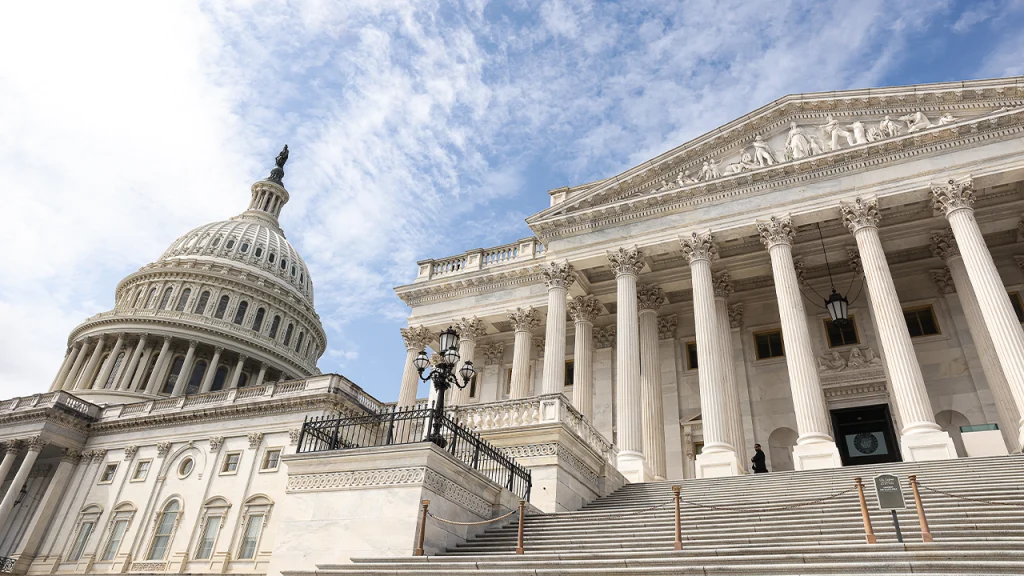Listen to the article
Senate Poised for Critical Vote on Shutdown-Ending Legislation
The Senate is expected to hold a pivotal test vote as early as tomorrow afternoon on revised Republican legislation aimed at ending the ongoing government shutdown. The bill would fund some government operations through the remainder of the fiscal year while providing a temporary solution for others.
Though the full text has yet to be released, the legislation is anticipated by tonight or early tomorrow. According to congressional sources, the measure would fund the government through late January while providing appropriations through September 2026 for several critical areas: the Agriculture Department (which administers SNAP food benefits), the Veterans Affairs Department, military construction projects, and Congress itself.
Unlike earlier proposals, this appears to be a clean spending bill without provisions for renewing Affordable Care Act subsidies, a key Democratic priority that had become a sticking point in negotiations.
For the bill to advance, it will need to secure 60 votes to overcome a procedural hurdle, requiring support from multiple Democrats. A final passage would require only a simple majority. Sources close to the negotiations have identified several moderate Democratic senators who might break ranks to support the measure, including Senate Minority Whip Dick Durbin of Illinois, Sens. Jeanne Shaheen and Maggie Hassan of New Hampshire, Jack Reed of Rhode Island, Jon Ossoff of Georgia, John Fetterman of Pennsylvania, Catherine Cortez Masto of Nevada, Gary Peters of Missouri, Angus King of Maine (an independent who caucuses with Democrats), and Patty Murray of Washington.
Murray, who serves as the ranking Democrat on the Senate Appropriations Committee, has reportedly secured significant language in the tentative spending agreement, potentially making it more palatable to Democrats.
“This is a fragile coalition and could fall apart,” cautioned one Senate aide familiar with the discussions. But if the Senate manages to break the filibuster, government reopening becomes a matter of when, not if.
The timeline remains fluid. While the Senate could theoretically vote as early as Sunday night if members reach a time agreement, progressive Democrats—frustrated by the absence of healthcare funding—might employ procedural tactics to extend debate. This could potentially push a final vote to Tuesday or later.
However, political pressure may prevent such delays, as prolonging the shutdown would only further delay SNAP benefits to vulnerable Americans, a core Democratic constituency.
Meanwhile, the House of Representatives remains on 48-hour recall notice and could return midweek to align with Senate action. The mathematics in the House are particularly tight. With Rep.-elect Adelita Grijalva (D-Ariz.) expected to be sworn in, the chamber would stand at 219 Republicans to 214 Democrats, meaning GOP leadership can only lose two votes before requiring Democratic support.
Moderate Democrats like Reps. Tom Suozzi of New York, Marie Gluesenkamp Perez of Washington, and Jared Golden of Maine could potentially cross party lines to support the measure. Golden was the sole House Democrat who voted for the previous interim spending bill in September. He has since announced his retirement.
Political observers note that the shutdown resolution could trigger significant internal Democratic discord between pragmatists willing to end the shutdown without healthcare subsidies and progressives who view such concessions as capitulation. The rift may be particularly pronounced between House and Senate Democrats once the crisis concludes.
“It’s entirely possible that a group of Senate Democrats threw their colleagues under the bus to end the shutdown,” noted one congressional analyst. “The party scored no guarantees on health care money despite their risky political shutdown gambit.”
As the longest government shutdown in recent history continues to impact federal workers and services nationwide, both parties face increasing public pressure to reach a resolution, even if it means abandoning some of their most cherished priorities.
Fact Checker
Verify the accuracy of this article using The Disinformation Commission analysis and real-time sources.




10 Comments
The proposed funding for SNAP, VA, and military construction projects sounds promising. Those are vital services that shouldn’t be held hostage to political disputes. Curious to see if this can break the logjam.
I agree, focusing on core government functions is the right approach. Let’s hope this test vote demonstrates that both parties are willing to compromise for the greater good.
It’s good to see the Senate trying a new approach to end the shutdown. Funding core government functions through the fiscal year is sensible, even if the details on specific programs need more scrutiny.
Definitely, the ability to keep critical services running is the priority at this stage. Hopefully this can pave the way for further negotiations on outstanding issues.
This test vote will be a key indicator of the political dynamics at play. With the need for 60 votes, it will require real bipartisanship to get this bill across the finish line. The public will be watching closely.
Absolutely, the pressure is on for lawmakers to find common ground. Avoiding another protracted shutdown should be the main objective at this point.
This seems like a pragmatic approach to break the gridlock – funding key areas while avoiding more divisive provisions. The vote tallies will indicate if there’s enough bipartisan momentum to move it forward.
Agreed, a clean spending bill without extraneous policy items could be the best path forward right now. Let’s see if they can find the votes.
Interesting that the Senate is moving forward with a test vote on this new spending bill. It will be crucial to see if they can get the bipartisan support needed to advance it. Curious to learn more about the specifics once the full text is released.
Yes, the details on the funding provisions will be important. Ending the government shutdown is critical, so I hope they can find common ground and get this passed.